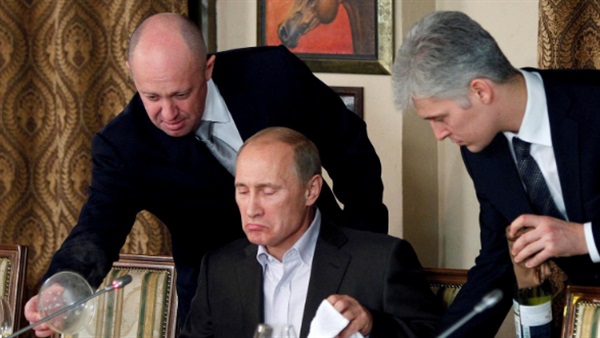Treasury ‘helped’ Wagner’s Yevgeny Prigozhin to evade sanctions

The UK government helped the head of Russia’s notorious
Wagner Group of pro-Kremlin mercenaries get around its own sanctions to launch
a legal attack on a British investigative journalist, it has been alleged.
The incident occurred in the months before Russia’s invasion
of Ukraine, while Rishi Sunak was chancellor, according to documents published
by openDemocracy, a British media outlet that focuses on human rights.
Wagner is led by Yevgeny Prigozhin, a Kremlin-linked tycoon
who is one of the most vocal advocates of President Putin’s war in Ukraine. The
group’s fighters have been accused of decapitating a deserter from President
Assad’s army in Syria and bludgeoning a former Russian convict to death with a
sledgehammer in eastern Ukraine, as well as numerous other human rights abuses.
Speaking in the Commons yesterday, Kevin Hollinrake, a
business minister, said the allegations that British legal firms helped
Prigozhin to avoid sanctions would be looked at “very carefully” and would be
“entirely unacceptable” if true.
Prigozhin was sanctioned by both the UK and the European
Union in 2020, as well as by the United States in 2018. This precluded him from
taking legal action in British courts but, with the help of a London-based
solicitor, he sought a special licence from the UK Treasury to get around the
sanctions, meaning he could launch a libel suit against Eliot Higgins, the
founder of Bellingcat, openDemocracy said.
Bellingcat had angered Prigozhin with a report that outlined
his shadowy operations, as well as his links to the Russian defence ministry
and the Kremlin’s military intelligence service, Gru. Prigozhin denied any
connection to Wagner until the start of the war, but now revels in his role. He
recently opened a Wagner Centre office in St Petersburg. Washington said last
week that it would designate Wagner as “transnational criminal organisation”.
Emails obtained by openDemocracy showed that despite
Prigozhin’s reputation as a Kremlin warlord, the UK treasury granted licences
for Discreet Law, a British legal firm, to work on the libel case. It also gave
permission for its lawyers to fly business class to St Petersburg, Prigozhin’s
hometown, to discuss it in person. The libel suit was part of Prigozhin’s
efforts to thwarts global sanctions. Discreet Law worked with Prigozhin’s
Russian lawyers, Capital Legal Services, the documents show.
The case was dropped after Putin ordered tanks into Ukraine
in February, leaving Higgins with estimated costs of £70,000. OpenDemocracy
said the case illustrated “the incredible ease with which one of the world’s
most notorious warmongers was able to use the UK legal system to try and
further his aims, even while sanctioned”.
Higgins said that UK officials were “embroiled in a scheme
to undermine the very sanctions they were responsible for governing”. He added:
“Wealthy individuals abuse the UK legal system to attack legitimate journalists
with the assistance of British lawyers.”
Roger Gherson, the head of Discreet Law, told the Financial
Times that the company had “at all times complied fully with their legal and
professional obligations”. The Treasury said “everyone has a right to legal
representation”.
Sunak is under pressure from a cross-party group of MPs to
stop Russian oligarchs using British courts to silence and intimidate
journalists.
Dominic Raab, the justice secretary, set out plans last year
to introduce so-called anti-Slapp legislation after Catherine Belton, a
distinguished journalist, was sued for libel by Roman Abramovich. The case
ended with a settlement and Belton was awarded an MBE.
Yesterday, Bob Seely, a Tory MP, used parliamentary
privilege to identify British lawyers who had worked for Russian clients
including John Kelly of Harbottle and Lewis ,who represented Abramovich, and
Geraldine Proudler of CMS, who represented Mikhail Fridman and Petr Aven.
He urged the government to support his bill which would make
it harder for journalists to be pursued by Russian oligarchs.
“Unethical law firms offer a one-stop shop to spy, to snoop,
to smear and to sue,” he said. “I think this as a business model is a form of
legalised intimidation, effectively legal gangsterism . . . these noxious
lawsuits are almost entirely motivated by the oligarchs’ motivation to curry
favour with President Putin.”
Bellingcat identified the Russian spies who carried out the
novichok poisonings in Salisbury in 2018. It also exposed the FSB agents who
tried to kill Alexei Navalny, the Russian opposition leader, in 2020.
“It is absolutely ludicrous that the government stands
accused of evading the sanctions it itself imposed,” said Dame Margaret Hodge,
a Labour MP. “If this is true, why did parliament not know about it? Where is
the accountability?”
The emails and documents cited by openDemocracy were the
result of a series of hacks against over 50 Russian companies and government
agencies after Russia’s invasion of Ukraine. OpenDemocracy said that while it
did not know the identity of the hackers, it had no reason to doubt the
authenticity of the information.
Wagner has recruited tens of thousands of convicts,
including convicted murderers, for the war in Ukraine, offering them their
freedom in return for a six-month tour of duty. His forces have played a key
role in heavy fighting around the towns of Bakhmut and Soledar in eastern
Ukraine.
An HM Treasury spokesman said: “We do not comment on
individual cases. Everyone has a right to legal representation and the Office
for Financial Sanctions Implementation can grant a licence to allow sanctioned
people to cover their own legal fees, provided the costs are reasonable.”





